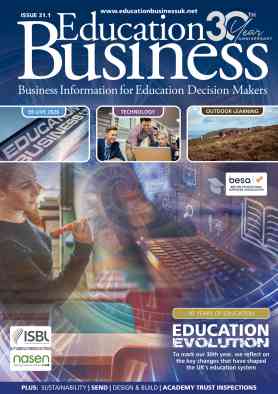Electronic tendering and the new regulations
Schools that make a purchase over the relevant EU threshold now have a requirement to carry out all communication and exchange of information relevant to the tender electronically. Crescent Purchasing Consortium outlines five points you need to know about the changes
Every school, academy, multi-academy trust and contracting authority that makes a purchase over the relevant EU threshold (typically £181,302 + VAT for goods and services), now has a requirement to carry out all communication and exchange of information relevant to the tender electronically due to new processes introduced by the Public Contract Regulations (2015) that came into effect on 18 October 2018.
Each institution must have access to tools and devices for the electronic receipt of tenders and the tools must meet the technical and security requirements set out in the Regulations. Therefore, if you do not have access already, you will need to make arrangements to purchase an e-tendering system to receive tenders. There are a number of different solutions available, all offering slightly different functionality, so researching each solution is time well spent. Our tips below consider the requirements in more detail including the requirements for e-communication generally.
1. Procurement documents must be available to download
You need to ensure any potential bidders for your tender can download the relevant procurement documentation at no cost electronically. You will need to provide them with a link to the appropriate webpage within your OJEU Notice.
Since 26 February 2015 the regulations have stated that all procurement documents must be available electronically for potential bidders to download at the time the OJEU Notice is published or when an Invitation to Express Interest is sent.
Guidance by Crown Commercial Services (CCS) does take a “purposive” view of the definition of “procurement documents” and suggests that what is meant by “procurement documents” changes based on the different stages of the process that has been reached. Best practice guidance on the publication of procurement documents requirements can be found on Further Education Library of Procurement (www.felp.ac.uk).
2. Document any non-electronic communications
We recommend that if you conduct any site visits or presentations as part of your procurement process, that you ensure they are adequately documented. You can document them as written or audio records or summaries of the main elements of the communication.
Since 26 February 2015 the e-communications regulations have stated that all oral communications must be documented, and essential parts of the tender process cannot be conducted orally.
3. Use a deal
You may not need to purchase an e-tendering system if you always procure above EU threshold contracts through a purchasing consortium. Some consortia may be able to provide you with free of charge access to an e-tendering system which complies with all the relevant Regulations if you procure using one of their deals.
4. Consider e-tendering support
Should you have a particularly complex procurement project and require one-off support and you employ a procurement consultant to run a tender for you, do ensure that as part of their service, they are utilising a compliant e-tendering system. Procurement consultancy services will require a fee for their service. You should be aware that some consultancies advertise ‘free services’ but they often result in a mandatory charge to the winning supplier, that is inevitably charged back to the institution within the cost of the goods or service. Ensure that you review the full terms of the contract from the procurement consultancy as hidden costs in the region of five per cent of the contract value are not uncommon, meaning you could pay significantly more indirectly in the long run.
Another option is to utilise a tender publication service offered by procurement consultants such as Tenet Education Services on a per tender basis. The consultants will publish your OJEU notice and tender documentation and simply act as the ‘mail exchange’ for clarification questions and submissions. Once you have completed your tender evaluation, they will post your feedback letters and award the contract on the system. This solution is cost effective if your organisation only requires to publish tenders on an infrequent basis.
5. Invest in an e-tendering solution
Having a subscription to an e-tendering system may be more cost-effective if your organisation undertakes multiple tenders that exceed the relevant EU threshold.
There are many benefits of using an e-tendering system; in addition to complying with the Regulations, e-tendering systems save you time as they speed up the tender cycle. The systems can also provide fast and accurate pre-qualification and evaluation enabling the automatic rejection of suppliers that fail to meet the tender specification and allow quicker responses to questions and clarifications. E-tendering systems reduce costs to both institutions and suppliers as they reduce administration tasks and the paper trail. The systems also increase integrity and transparency by providing an improved audit trail.
Should you be looking for e-tendering solutions, purchasing consortia may be able to advise. Some consortia provide a suite of e-tendering tools designed to provide a one-stop-shop for all e-tendering requirements. One option is the CPC Sourcing Cloud which is an e-tendering tool that has been designed for the education sector by CPC, in partnership with ADB Limited.
Crescent Purchasing Consortium
Crescent Purchasing Consortium (CPC) is owned and run by the education sector. CPC provides safe deals designed for educational establishments covering a wide variety of products and services. The Department for Education recommends 13 of CPC’s deals, including; desktop hardware, ICT solutions, software licences, photocopiers, printers and scanners, insurance, audit services, building cleaning services, PAT testing, leasing services, legal services, removals, library resources and employee screening including DBS checks.
CPC provides its members access to CPC Sourcing Cloud an e-tendering solution that allows you to run all your procurement exercises (local, above EU threshold or through CPC deals) within the same system, providing a single repository to record and manage all of your tendering activity. CPC membership is free of charge to schools, academies and the FE sector. Tenet Education Services operate as part of the CPC Group
Latest News
12/02/2026 - 09:56
Time spent dealing with pupil behaviour and providing pastoral support plays a significant role in teachers choosing to leave the profession.
12/02/2026 - 09:40
A new roundtable focused on delivering high-performance, sustainable school buildings will launch at Education Business Live on 26 March at Old Billingsgate, London.
11/02/2026 - 10:53
The government has launched its new ten-year Education Estates Strategy, backed by £1 billion.
11/02/2026 - 10:11
The Education Committee says that despite government progress towards removing RAAC from schools, significant concerns remain about the condition of England’s school estate.
10/02/2026 - 09:47
Spending on schools across Scotland has increased by more than £1 billion in real terms over the past decade, statistics show.







